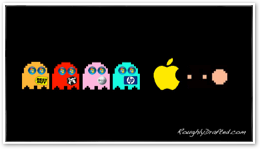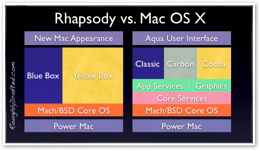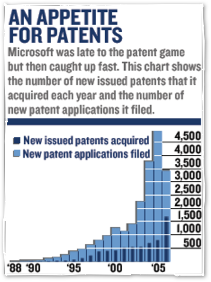


How is an untouchable superpower defeated? In many cases, it foolishly engages itself in an unwinnable war and simply consumes itself.
Microsoft, threatened by the encroachment of competition from open source, has long waged a detached propaganda war against free software and in particular Linux, but has recently escalated its conflict into a full blown attack. Here's what's happening, and why it will greatly accelerate the company's undoing.
Bill Gates' Infatuation With Software.
Back in the dawn of desktop computing, Bill Gates led the ideology that software was going to be the sole currency of the new economy. Throughout the 80s and 90s, Gates led Microsoft with the goal of making PC hardware a simple commodity, leaving software the main source of value and profits in the industry.
Microsoft's success in installing itself as a wide but shallow layer in the PC industry helped the company earn a steady increase of fantastical profits while its PC hardware partners struggled through boom and bust cycles. Gates seemed to know where the real money was in PCs: software. 

For many years now, Gates has described his vision of the future as a world where customers will subscribe to Microsoft's software and automatically pay to use it at regular intervals, rather than buying retail boxes that can only claim an upgrade fee when there is an actual upgrade delivered.
Three Perspectives on the Software Business.
Gates' efforts to build a world exclusively ruled by proprietary software antagonized two camps of alternative opinions. The first differing viewpoint is presented by Free and Open Source Software, a general movement to develop shared software resources that others can use, adapt, and improve upon.
FOSS developers make a business case for sharing the work to develop software products, with the goal of producing high quality, interoperable tools that can be used by anyone at no cost. In the world of FOSS, software is a just a lubricant on the machinery of business.
A third perspective on software development originated with hardware makers. Companies like Apple, Cisco, IBM, and Sun all originally developed their own software. In most cases, it was not to directly market the software like Microsoft, but rather to play a supporting but critical role in selling their hardware.
In Apple's case, while it invested millions in developing Mac software, it only really used that software to sell its Mac hardware. For years, Apple didn't make much of an effort to sell its software at all; it was, in the manner of FOSS development, simply using software as a lubricant for its hardware sales.

Bizarre Love Triangle.
These three approaches to software development resulted in the development of today's triangle of desktop operating systems:
-
•Microsoft Windows
-
•FOSS' GNU/Linux
-
•Apple's Mac OS X
Microsoft made its business selling Windows licenses to PC hardware makers. The PC makers grew up dependent upon Microsoft in return, creating a symbiotic relationship between the two, where each is dependent upon the other to advance development of the PC platform.
The GNU/Linux community built an alternative to Microsoft's commercial software for PCs; in doing so, they grew dependent upon the PC manufacturers who themselves were dependent upon Microsoft.
The result is that everything Linux can accomplish is at least indirectly tied to Microsoft. That's why Palladium, Microsoft's effort to lock down the PC to only run “approved software,” struck fear into the FOSS world.
Microsoft leads the PC world and can take it in dangerous directions; it most certainly does not want to be supplanted in the PC realm, and has vigorously worked to kill encroaching competitors who tried, from DR-DOS to IBM’s OS/2 to BeOS to NeXTSTEP to today's Linux.
By the mid 90s, Apple ended up as the only other significant, independent commercial desktop platform remaining. That put Apple in a unique position: it developed its own operating system software, so unlike other PC manufacturers, it was not beholden to Microsoft; unlike Microsoft, Apple did not really make any money from direct sales of its software.
I Love To Hate You.
Three very different positions resulting from the three different perspectives on software make for some interesting relationships between them.
-
•Microsoft views both FOSS and Apple as competitive threats, but also uses them for inspiration.
-
•FOSS views both Microsoft and Apple as proprietary software dinosaurs, but depends upon the hardware and markets they drive.
-
•Apple, as a minority player, views both Microsoft and FOSS as integration partners but also works to outperform them with more accessible and integrated products.
On the subject of open source however, Apple can find more common ground with FOSS development than can Microsoft, because each uses a very different business model. 

Microsoft already sits on the majority of the market, and operates a high volume, low profit software licensing business model in direct contention with free software development.
Apple's low volume, high profit integrated hardware business model serves to distance Linux and Macs from being direct competitors.
The Iron Curtains of Microsoft.
Any new PC territory claimed by FOSS means less market share for Windows; a even a small but a significant decrease in Microsoft's holdings would severely weaken its monopoly position, forcing it to justify the expense of its software and directly compete in a difficult, multi-front battle.
Apple isn't threatened by a competitive marketplace, because it has little to lose and lots to gain. Few of its customers--who have gone out of their way to use Macs for their integration and polish--are suddenly going to be tempted to roll their own solutions with Linux or choose to return to using Windows PCs.
Similarly, FOSS developers are not concerned about losing customers to commercial platforms, because nobody is being held hostage to use Linux against their will either.
That has prompted Microsoft to erect iron curtains in its information war against competing alternatives. It must prevent its OEMs from doing business with other vendors, it must warn its Enterprise users of the fearsome dangers of using other platforms, and it must inextricably link its desktop users' applications, games, media and files to Windows so they can't ever leave.
The Changing Tide.
These circumstances have been in place for well over half a decade with little obvious movement in market share. Microsoft has maintained its monopoly position, FOSS has struggled to make any inroads on the desktop, and Apple has remained in a small minority position. Things under the surface have changed dramatically however.
Among them is the fact that Apple has partnered with open source in key areas where its own interests align with FOSS developers.
As a commercial developer with a significant installed base of customers in key markets, Apple's support for open alternatives rather than the de facto, proprietary standards pushed by Microsoft has helped to support the position of resistance incited by FOSS--and in particular Linux--users pushing for open interoperability.
A few key examples are Apple's support for:
-
•OpenGL over Microsoft's proprietary DirectX/3D
-
•PDF over Microsoft's proprietary XPF
-
•LDAP and Kerberos in addition to Microsoft's proprietary version of Active Directory
-
•web standards over Microsoft's proprietary Internet Explorer extensions
Moving Toward Interoperability and Open Standards.
Apple is not supporting open, interoperable standards and protocols to give away the company's value as part of a hippie love-in, but because it makes business sense.
The better Apple's products work with other systems, the more attractive its products will be. That's why the company also works to build interoperability with closed and proprietary standards that are entrenched in the market, including Microsoft's Active Directory service.
Microsoft is also growing to recognize the value of interoperability and open standards. Parts of the company have released technologies to open standards bodies, and Microsoft employees report that there is a new push to embrace standards-based development. This is due in part to the fact that development using open standards simply makes business sense.
Other hardware makers in a position similar to Apple, including Cisco, IBM, and Sun, have also worked to incorporate FOSS, open their own software, and work to use interoperable standards. These companies were all once known for hoarding their proprietary software away as secrets that needed to be protected, and for resisting outside ideas as shunned, “Not Invented Here” foreign developments. Things change.
FOSS Reevaluates Microsoft with .Net and Mono.
As the stalwart champion of closed, proprietary software, Microsoft has long accumulated a reputation as a planet inhospitable to any form of FOSS life forms. However, recent rumblings of change have suggested that a new world of interoperability is afoot, and that Microsoft may actually take the lead in launching new open standards.
One example is .Net, a general marketing name that includes new development frameworks that aspire to replace Windows' former Win32 platform with a modern new platform formerly referred to as Longhorn's WinFX, and now called Windows Vista and the .Net Framework 3.0.
Conceptually, this new framework has a lot in common with Apple's Cocoa frameworks in Mac OS X. The main difference is that while Apple has made no effort to offer an open specification for third party implementations of Cocoa (the way NeXT earlier opened up its predecessor under the name OpenStep), Microsoft has submitted portions of .Net technologies to the ECMA standards body.
Back in 2000, Microsoft's release of .Net's C# language and its Common Language Infrastructure captured the attention of Miguel de Icaza, a FOSS developer behind the Linux GNOME environment.
De Icaza started Mono, an open source project to implement Microsoft's .Net development platform for Linux. His company, Ximian, also worked to create an open source alternative to Microsoft's Exchange Server, called Ximian Evolution.
Ximian was bought up by Novell, which continues to support the development of Mono for a variety of platforms, including Apple's Mac OS X. Last fall, Microsoft entered into an agreement with Novell to not sue each others’ customers for patent infringement. This includes Novell customers using Mono. 

Does this mean that Microsoft is now aligned with open source developers and working to push open, interoperable implementations of its software? Is the old triangle of contention between Microsoft, Linux and Apple dissolving into a free and open love circle?
Ha Ha, No.
Microsoft is not trying to usher in a new OpenStep with .Net. It is working to usher in a new Win32: another decade of dependance upon Microsoft software that can only work on Windows. Why the subterfuge on submitting portions of .Net to standards bodies? Three guesses, and the first two don't count!
The best way to keep opponents busy is to give them false directions that lead into traps. This will distract them from blazing their own successful, competing trail, and will lead them directly into containment with the least mess and inconvenience.
Microsoft is leading Mono users and developers into a pleasant feeling trap. Along the way, they gain appreciation for Microsoft's development tools as they struggle to make their own open source copies. They will grow increasingly familiar with Microsoft's directions, up to the point where they are hopelessly brainwashed into thinking that Microsoft is leading technology into a paradise of openness.
Then Microsoft will spring out its patent gun and offer a tight ultimatum: join or die. The only options for Mono developers will be to get bought out by Microsoft and join the collective, or to suddenly face the fact that Microsoft will always be two steps ahead in knowing where .Net is headed, and will have a laundry list of patents--obvious or not--lined up waiting for anyone who attempts to use its own technology to compete with it.
We already know that Mono development exists at the whim of Microsoft, and that dangerous looking stalactites of patent threats point down from above. Mono developers insist that Microsoft is a changed company and would never let anything bad happen to developers working to extend the features of its .Net.
Microsoft's own icy embrace of Mono developers is to offer a license that allows them to do anything but offer commercial software. Mono is nothing more than a training camp on how to serve Microsoft that leads to a do or die diploma ceremony at the end.
You thought Microsoft was serving the open source community? Why?
Microsoft's New Patent War on Linux.
Mono isn't the only trap set for FOSS developers. While Microsoft has hinted at using patents to attack open source before, it has now moved from suggestion to accusation; it has turned off its safety and is taking aim at the hearts of FOSS developers, not to win them, but to shoot them.
In an article by Fortune, published by CNN, Microsoft announced that “Linux” violates at least 235 of its patents. It described a new litigation strategy for getting FOSS users to pay Microsoft royalty fees for their transgressions.
Among the patents infringed upon are 45 that apply to OpenOffice and 83 that apply to FOSS applications that are not part of the Linux kernel or its commonly associated graphical interface.
This isn’t just an attack on Linux, it’s an attack on open source development in general. That is a spectacularly bad idea for Microsoft to pursue.
Microsoft's announcements make it clear that the company isn't just working to protect its intellectual property, but that it really hopes to drag FOSS into a long term war in order to terrorize its own users who may be interested in open source, and thereby retain them as tightly held subjects within the walls of its iron curtains.
If Microsoft had any ideas to protect, it would simply lay them out and insist that Linux and other FOSS projects stop using them improperly. Instead, Microsoft is keeping its patent details a secret, while working to generate panicked headlines about the dangers inherent in using open source software.
Microsoft doesn’t want results, it wants to incite a climate of fear.
This All Happened Before.
Sound familiar? Microsoft's last assault on Linux was played similarly, albeit behind the mask of the SCO Group.
Microsoft invested tens of millions of dollars in the SCO Group, purportedly to license the company's Unix software. Why did Microsoft need such a massively expensive license from a litigation group which the rest of the tech industry--along with the stock market--valued as worthless?
Microsoft wasn't paying for the legitimate use of Unix code, it was funding the SCO Contras with illicit weapons to enable them to continue their own war against a common enemy: Linux.
Microsoft was also floating the idea that businesses faced multimillion dollar risks by using anything other than Windows in their business. “Oh no, look at me! I'm paying out craploads of money because I touched Unix! Don't make the same expensive mistake!”
Apart from a few other idiot companies who voluntarily threw money at the frauds at SCO, nobody who used Linux was found to owe the company anything. Microsoft's fantastically expensive license did keep SCO in business long enough to create years of terrorized fear surrounding the future outlook of Linux however.
SCO kept making accusations of intellectual property theft, but it kept hiding all the supposed proof. Like professional contribution collectors such as Greenpeace, SCO wasn't after action-oriented results, but only hoped to keep itself in the headlines long enough to drum up some threat money.
Just like Microsoft is doing now.
The Failure of War.
The problem for Microsoft is that it’s following a strategy of failure. SCO failed because it had no leg to stand upon in its invented war on Unix copyright violations. Microsoft similarly knows that its patent pool is not only a weak weapon that will be difficult to target and fire, but one that may likely explode in its face.
The problem with patents is that they are a lot like nuclear weapons: they pose a lot of threat, but you can't actually launch them to accomplish anything useful. Once you drop one, you'll have several more being dropped in return, negating any net results.
Like the cold war nukes, the only real purpose patents serve is to create a fear of mutually assured destruction that incites entities to work together. When Creative pulled out its iPod patent against Apple, Apple turned around with a handful of patents that could scrape the remains of Zen droppings from the floor. The result was a civil agreement that funded Creative and made it an Apple partner.
Such agreements aren't possible when patent holders try to attack individuals and create a general state of fear. Image if Creative had tried to sue iPod customers, and Apple responded by suing Zen customers! The only possible result would be disgust on the part of music player customers in general, and the badmouthing of Zens and iPods in particular. Everyone would lose.
Everyone would lose.
 Everyone would lose.
Everyone would lose.Imagine how popular it will be for Microsoft to start suing companies that have mixed Linux and Windows operations. What would that do to prop up Microsoft loyalty figures or sales?
Will it incite interest in Microsoft’s other attempts to gain the attention of developers, including Silverlight?
Microsoft's Known Unknowns.
Like the RIAA, Microsoft must face the reality that suing your own customers is a strategy of failure. But consider what else will happen if the companies that defended Linux from SCO--and who now center their business on FOSS--turn their attention to Microsoft’s patent attacks in return.
IBM certainly has some patents of its own. Is it likely that Microsoft might violate some of them? Because Microsoft's Windows source code is secret, we would never know unless the company were foolish enough to open itself to legal scrutiny by inviting such retaliation.
And of course, there is another matter that Microsoft might unwittingly crack open: by launching a full frontal assault on open source using its software patents, Microsoft risks calling the legitimacy of software patents in general into question. The US Supreme Court has not ruled on software patents before.
However Fortune reported that just a month ago, the Supreme Court “stated in a unanimous opinion that patents have been issued too readily for the past two decades, and lots are probably invalid. For a variety of technical reasons, many dispassionate observers suspect that software patents are especially vulnerable to court challenge.”
As Microsoft begins waging its all out war against Linux, how far will its popularity decline? And will that war be conveniently limited to a far away land, or might it cause fear and distress to Microsoft's own customers? Would Microsoft's own customers be targeted as potential enemies in massive, RIAA-style crackdowns?
When asked by Fortune whether Microsoft would ever seek to “sue its customers for royalties, the way the record industry has,” Microsoft CEO Steve Ballmer answered, “That's not a bridge we've crossed, and not a bridge I want to cross today on the phone with you.”
That should certainly scare the Windows out of Microsoft's customers.
Like reading RoughlyDrafted? Share articles with your friends, link from your blog, and subscribe to my podcast!
Next Articles:
This Series

Haloscan Q107
Microsoft's Unwinnable War on Linux and Open Source
Tuesday, May 15, 2007

Ad










 Bookmark on Del.icio.us
Bookmark on Del.icio.us Discuss on Reddit
Discuss on Reddit Critically review on NewsTrust
Critically review on NewsTrust Forward to Friends
Forward to Friends
 Get RSS Feed
Get RSS Feed Download RSS Widget
Download RSS Widget





